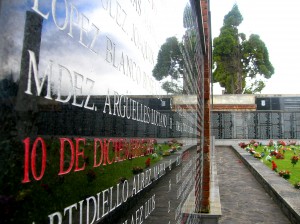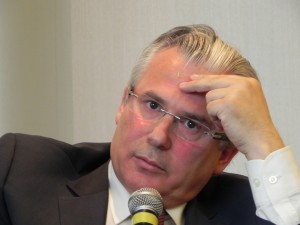Spaniards want truth on Franco’s crimes
“In Spain…the Franco regime massacred thousands, but the people are not aware of what occurred here,” says Jordi Gordon, an advocate of the new Truth Commission Platform, which aims to persuade the Spanish government to investigate the crimes committed under Francisco Franco. “What happened is not taught in an open, clear, democratic way. No one talks about the kidnapped babies. No one talks about the disappeared persons. No one talks about the people who were executed. No one talks about the concentration camps and forced labor camps. No one talks about any of this.”
The Platform is comprised of over one hundred organizations, including all the primary historical memory associations, the International Baltasar Garzón Foundation, the Association of Friends of the International Brigades, and the Abraham Lincoln Brigade Archives (see sidebar). They’ve banded together to demand that Spain investigate Franco’s crimes, open the country’s mass graves, and include the ugly truth of the dictatorship in the history textbooks used in Spanish schools. An amnesty law prevents Spanish judges from investigating these crimes, and the disbarment of Judge Baltasar Garzón in 2012 left victims without the possibility of seeking recourse within the Spanish judicial system. Furthermore, the Spanish government has consistently intervened against Argentine judge María Servini’s attempts to carry forward a case opened by Franco’s victims in 2010. And the country’s Historical Memory Law, passed in 2007, “has led to nothing,” according to Gordon.
The Socialist Party (PSOE) and the United Left (IU) have agreed to draft a parliamentary resolution calling for a truth commission that would be presented to the Spanish Congress, but the conservative Partido Popular (PP), which has an absolute majority, is unlikely to support it. The presentation of the resolution, in September, will coincide with a visit to Spain by the United Nations’ Working Group on Enforced or Involuntary Disappearances.
Over 40 countries have employed truth commissions after violent dictatorships or civil wars, not always with satisfactory results. Successful truth commissions include those of Perú, South Africa, and Argentina, but other countries, such as Uganda, created commissions without giving them the necessary resources to fulfill their mandate.

Monument commemorating the victims of Nationalist repression in the mass grave at the San Salvador Cemetery in Oviedo, Spain. Photo Pablo G. Pando. CC BY 2.0.
“In terms of what a truth commission can accomplish, so much depends not on the commission itself but on the political, economic, and social environment in which it operates,” says Eric Weibelhaus-Brahm, an associate instructor at Florida State University who has been studying truth commissions for over a decade. Brahm draws a distinction between success and impact: The success of a truth commission depends on factors such as who is chosen to be on the commission and what resources the commission has to investigate, but the impact of the commission generally depends on the strength of a country’s civil society. Brahm thinks that if Spain were to establish a truth commission it could likely be successful, but its impact would depend on its reception by Spanish society. Nonetheless, Brahm says, “if [a truth commission in Spain] helps a substantial number of victims, survivors, family members…, that, to me, is sufficient reason for going ahead with the investigation.”
Adriana Fernández, the granddaughter of one of Franco’s victims and a plaintiff in the stalled Argentine trial of crimes committed under Franco’s rule, says that for her a truth commission isn’t enough—but it is a move in the right direction. “At least a step is being taken towards finding the truth,” she adds. “Later, it will be possible to demand justice, when Spanish society has more awareness about its history.”
Organizations like Amnesty International and Human Rights Watch agree that, ideally, prosecutions follow on the heels of truth commissions, says Brahm, “if you read between the lines” of their published material on the topic. But both Brahm and Jordi Gordon are not optimistic about the possibility of widespread prosecutions in Spain. Perpetrators and witnesses are dying, and evidence is fading as the years pass. In fact, a Spanish truth commission would be “pretty historical” and, in that sense, “unique compared to what other countries have done,” Brahm says.
Though perhaps historical in nature, a Spanish truth commission would hopefully have an immediate impact, maintains Gordon. “Spain has a blot on its entire democratic trajectory, which are the crimes committed under Francoism. A democratic state in Spain can only be truly democratic if it recognizes what Francoism was.”
Eilís O’Neill is a freelance journalist currently based in Buenos Aires, Argentina. She works in print and radio with a particular focus on social issues and the environment.













